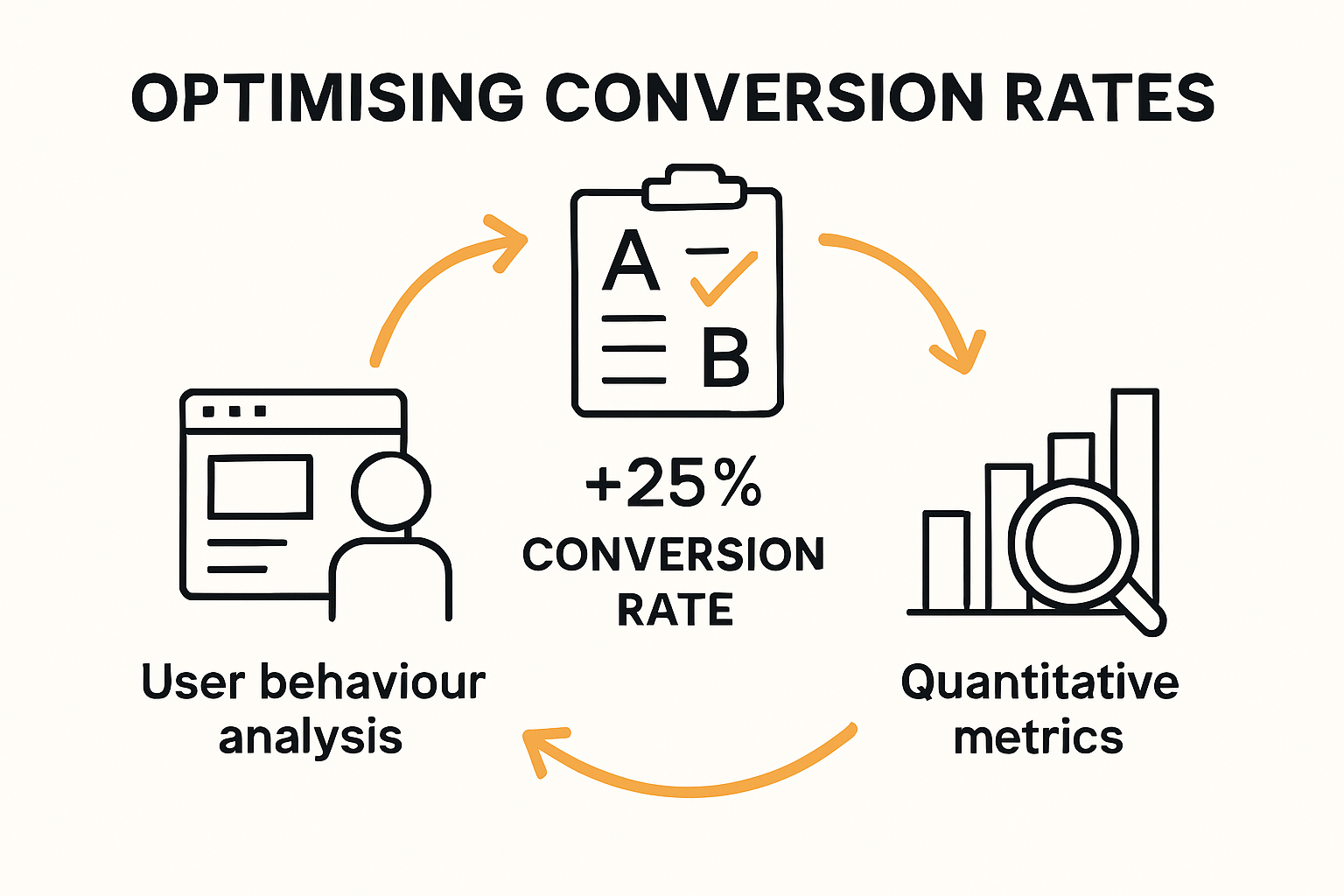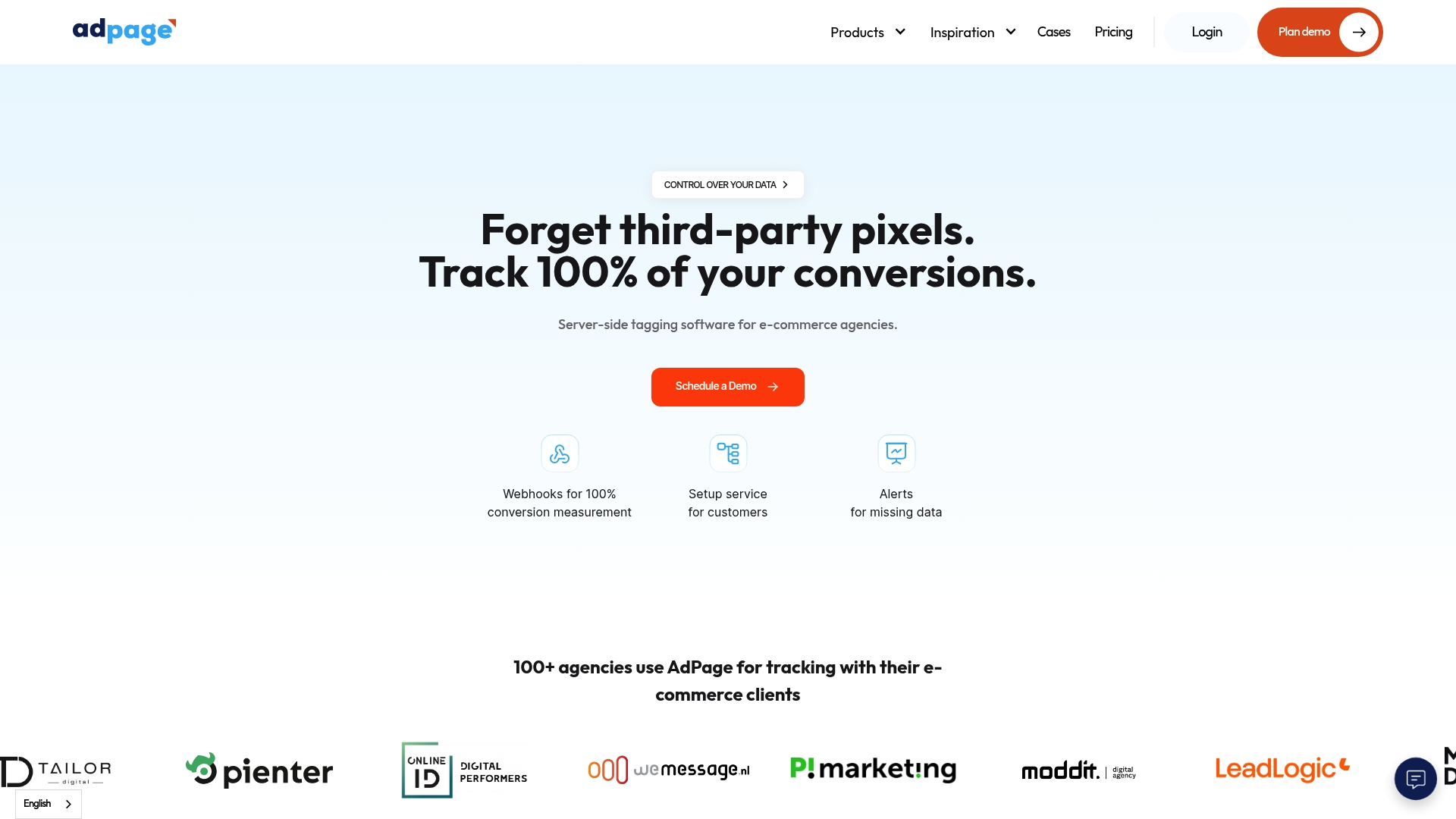Online marketing is now at the heart of every business that wants to thrive online. Digital campaigns reach millions daily and yet almost 40 percent of marketing budgets often go to waste due to poor targeting or ineffective strategies. That sounds shocking with so much technology at our fingertips. The real surprise is that a few simple shifts in responsibility and smarter analytics can instantly turn those wasted efforts into real, measurable business growth.
Table of Contents
- Core Online Marketer Responsibilities Explained
- Driving Growth With Effective Digital Strategies
- Optimising Conversion Rates And User Experience
- Leveraging Analytics For Better Decision Making
Quick Summary
| Takeaway | Explanation |
|---|---|
| Strategic planning is crucial for online marketing success. | Developing detailed marketing strategies ensures alignment with business goals and effective audience engagement. |
| Data analytics drives marketing effectiveness. | Implementing tracking and interpreting data helps refine campaigns and identify opportunities to boost performance. |
| Multi-channel strategies enhance customer engagement. | Cohesive messaging across platforms improves visibility and fosters meaningful interactions throughout the customer journey. |
| Optimising user experience boosts conversion rates. | Creating intuitive interfaces and understanding user behaviour are essential for guiding visitors towards making purchases. |
| Actionable insights transform data into strategic advantages. | Effective marketing relies on turning complex data into clear, decisive actions that drive business growth. |
Core Online Marketer Responsibilities Explained
Online marketers play a critical role in connecting businesses with their target audiences through digital channels. Their responsibilities extend far beyond simple advertisement placement, requiring a sophisticated understanding of digital strategies, data analysis, and consumer behaviour.
To better understand the range of core online marketer responsibilities described, the following table summarises key areas, their main tasks, and the benefits each delivers for business success.
| Responsibility Area | Key Tasks | Business Benefits |
|---|---|---|
| Strategic Planning | Develop marketing strategies, align with business goals | Clear direction, effective audience engagement |
| Performance Tracking & Analytics | Monitor data, analyse metrics, refine strategies | Improved campaign results, measurable impact |
| Multi-Channel Marketing Execution | Create cohesive content, manage various platforms | Broader reach, increased engagement |
| Conversion Optimisation | Analyse user behaviour, test interfaces, optimise experience | Higher conversion rates, increased revenue |
| Technology Integration | Implement advanced tools, automate marketing processes | Greater efficiency, real-time adaptability |
| Analytics & Actionable Insights | Generate reports, interpret data, inform decision-making | Faster, smarter business decisions |
Strategic Digital Marketing Planning
Successful online marketing begins with comprehensive strategic planning. According to the Society for Human Resource Management, online marketing managers must develop and implement robust digital marketing programs designed to increase sales and revenue. This involves creating detailed marketing strategies that align with broader business objectives, identifying target audience segments, and selecting appropriate digital platforms for engagement.
The planning process requires deep market research, competitive analysis, and a nuanced understanding of digital consumer trends. Online marketers must continuously assess emerging technologies, platform capabilities, and shifts in user behaviour to craft strategies that remain relevant and effective.
Performance Tracking and Analytics
Data sits at the heart of modern digital marketing efforts. Online marketers are responsible for implementing sophisticated tracking mechanisms that provide actionable insights into campaign performance. Generation.org highlights the critical importance of utilising digital channels and technologies to promote brands effectively.
These professionals must be proficient in various analytical tools, enabling them to:
- Monitor website traffic and user engagement metrics
- Analyse conversion rates across different marketing channels
- Interpret complex data sets to refine marketing strategies
- Generate comprehensive performance reports for stakeholders
The ability to translate raw data into strategic recommendations separates exceptional online marketers from average performers. They must develop a keen eye for identifying patterns, understanding user journeys, and predicting potential market opportunities.
Multi-Channel Marketing Execution
Modern online marketing demands expertise across multiple digital platforms and communication channels. Marketers must craft cohesive messaging that resonates consistently across websites, social media, email campaigns, and emerging digital touchpoints.
This requires exceptional skills in content creation, search engine optimisation, paid advertising management, and understanding the nuanced communication styles of different digital platforms. The goal is not just visibility, but meaningful engagement that drives potential customers through the conversion funnel.
Learn more about advanced tracking strategies that can elevate your digital marketing performance and provide deeper insights into consumer behaviour.
Online marketers must remain adaptable, continuously learning and evolving their skillset to match the rapid pace of digital transformation. Their role is not static but dynamic, requiring constant upskilling and a proactive approach to emerging marketing technologies and consumer trends.
Driving Growth with Effective Digital Strategies
Digital strategies are the cornerstone of modern business growth, transforming how organisations connect with potential customers and drive revenue. The landscape of digital marketing demands a sophisticated approach that goes beyond traditional advertising methods, focusing on strategic, data-driven techniques that deliver measurable results.
Targeted Customer Acquisition Techniques
Successful digital growth strategies begin with precision targeting. Businesses must move beyond broad marketing approaches and develop highly specific customer acquisition techniques. Nielsen Research indicates that companies using advanced segmentation techniques can improve marketing efficiency by up to 40% and reduce customer acquisition costs.
Effective targeting involves multiple critical components:
- Persona Development: Creating detailed customer profiles that capture demographic, psychographic, and behavioural characteristics
- Predictive Analytics: Utilising advanced data models to anticipate customer needs and preferences
- Micro-Targeting: Developing hyper-specific marketing messages for distinct audience segments
The goal is not merely reaching potential customers but engaging them with precisely crafted messages that resonate with their specific needs and interests.
Multichannel Conversion Optimization
Conversion optimization represents a critical strategy for driving business growth. Online marketers must design integrated experiences that seamlessly guide potential customers through the purchasing journey. Harvard Business Review emphasises that businesses implementing comprehensive multichannel strategies see an average of 25% higher conversion rates compared to single-channel approaches.
Key strategies for multichannel conversion include:
The section below organises the key multi-channel conversion optimisation strategies, highlighting their purpose and expected result for a concise overview.
| Strategy | Purpose | Expected Result |
|---|---|---|
| Consistent Messaging | Uniform brand communication across all platforms | Improved brand trust |
| User Experience Design | Create seamless, intuitive customer journeys | Reduced friction, higher sales |
| Dynamic Content Adaptation | Personalise content for user segments | Greater relevance, more engagement |
- Consistent Messaging: Ensuring brand communication remains uniform across different platforms
- User Experience Design: Creating intuitive, frictionless pathways from initial contact to final purchase
- Dynamic Content Adaptation: Personalising content based on user interactions and preferences
Discover advanced techniques for boosting online sales that can transform your digital marketing approach and drive substantial revenue growth.
Strategic Technology Integration
Modern digital strategies require sophisticated technological integration. Online marketers must leverage cutting-edge tools and platforms that enable advanced tracking, analytics, and customer engagement. This involves implementing robust technological ecosystems that provide real-time insights and enable rapid strategic adjustments.
Technology integration encompasses:
- Advanced Analytics Platforms: Tools that provide deep insights into customer behaviour
- Artificial Intelligence: Machine learning algorithms that enhance targeting and personalization
- Automated Marketing Systems: Platforms that streamline campaign management and execution
The most successful digital strategies are those that combine human creativity with technological precision, creating dynamic marketing approaches that can quickly adapt to changing market conditions.
Driving growth through digital strategies is not a static process but a continuous evolution. Online marketers must remain agile, constantly learning and adapting their approaches to meet the complex demands of the digital marketplace.
Optimising Conversion Rates and User Experience
Converting website visitors into customers represents the ultimate goal of digital marketing strategies. Online marketers must focus on creating seamless, intuitive experiences that guide potential customers through a frictionless journey from initial engagement to final purchase.
Data-Driven Conversion Optimization
Conversion rate optimization requires a methodical, analytical approach. According to research from ResearchGate, systematic A/B testing of website elements can significantly improve user experience and conversion rates. This approach involves continuous experimentation and refinement of digital touchpoints.
Key strategies for data-driven optimization include:
- Detailed User Behaviour Analysis: Mapping precise user interactions and identifying potential friction points
- Quantitative Metrics Tracking: Measuring conversion rates, bounce rates, and user engagement indicators
- Predictive Performance Modeling: Anticipating user responses through advanced analytics
Successful marketers understand that conversion optimization is not a one-time task but an ongoing process of incremental improvements and strategic adjustments.

User Experience Design Principles
User experience sits at the heart of effective conversion strategies. Every digital interaction must be designed with user intuition and comfort in mind. This means creating interfaces that are not just visually appealing but fundamentally user-centric.
Critical UX design considerations encompass:
- Intuitive Navigation: Ensuring users can effortlessly find what they need
- Responsive Design: Creating seamless experiences across different devices and screen sizes
- Psychological Triggers: Implementing design elements that encourage positive user actions
Discover expert strategies for increasing conversions that can transform your digital marketing approach and drive substantial business growth.
Psychological Targeting and Personalization
Advanced conversion optimization goes beyond technical implementations, diving deep into understanding user psychology. Marketers must craft experiences that speak directly to individual user motivations, preferences, and emotional triggers.
Personalization strategies involve:
- Dynamic Content Adaptation: Tailoring website experiences based on user characteristics
- Contextual Messaging: Developing communication that resonates with specific user segments
- Emotional Engagement Design: Creating connections that transcend purely transactional interactions
The most effective conversion strategies recognize that behind every click and interaction is a human being with complex motivations and expectations. Online marketers must blend technological precision with genuine human understanding to create truly compelling digital experiences.
Ultimately, optimising conversion rates is about creating value for users. It requires continuous learning, rigorous testing, and a commitment to understanding and meeting user needs in increasingly sophisticated ways.
Leveraging Analytics for Better Decision Making
Analytics have transformed digital marketing from a speculative practice to a precision-driven discipline. Online marketers now possess unprecedented capabilities to understand, predict, and influence customer behaviour through sophisticated data analysis techniques.
Advanced Data Interpretation Strategies
Modern analytics goes beyond simple metric tracking. According to academic research from ResearchGate, data analysis enables organizations to make informed strategic decisions that directly impact business performance and marketing effectiveness.
Advanced data interpretation involves:
- Predictive Modeling: Using historical data to forecast future trends and customer behaviours
- Multivariate Analysis: Examining complex interactions between multiple marketing variables
- Machine Learning Algorithms: Developing adaptive systems that continuously refine analytical insights
Successful marketers understand that raw data means little without sophisticated interpretation and strategic application.
Real-Time Performance Tracking
Immediate insights have become crucial in digital marketing. Real-time performance tracking allows marketers to make instantaneous adjustments, minimizing wasted resources and maximizing campaign effectiveness.
Key real-time tracking components include:
- Comprehensive Dashboard Design: Creating intuitive visualizations of critical performance metrics
- Automated Reporting Systems: Generating immediate alerts for significant performance changes
- Cross-Channel Performance Integration: Monitoring interactions across multiple digital platforms
Explore best practices for advanced analytics implementation to transform your marketing decision-making processes.
Strategic Insights and Actionable Intelligence
Transforming data into actionable intelligence represents the pinnacle of marketing analytics. This requires moving beyond descriptive statistics to develop strategic insights that drive meaningful business outcomes.
Strategic insight generation involves:
- Segmentation Analysis: Understanding distinct customer groups and their unique characteristics
- Behavioural Pattern Recognition: Identifying underlying motivations and potential future actions
- Competitive Benchmarking: Comparing performance against industry standards and competitors
The most effective online marketers treat analytics not as a reporting tool, but as a strategic decision-making framework. They recognize that each data point represents an opportunity to understand customer needs more deeply and create more targeted, effective marketing approaches.
Ultimately, leveraging analytics is about converting complex information into clear, decisive strategies. It demands a combination of technological sophistication, analytical thinking, and strategic vision. Marketers who master this approach can transform raw data into powerful competitive advantages, driving business growth through intelligent, data-driven decision-making.

Frequently Asked Questions
What are the core responsibilities of an online marketer?
Online marketers are responsible for strategic digital marketing planning, performance tracking and analytics, multi-channel marketing execution, conversion optimisation, technology integration, and generating actionable insights from data.
How does data analysis impact online marketing success?
Data analysis enables online marketers to monitor campaign performance, refine strategies, and identify opportunities for improvement, ultimately leading to more effective and targeted marketing efforts.
Why is multi-channel marketing important for businesses?
Multi-channel marketing ensures cohesive messaging across various platforms, enhancing customer engagement and increasing the chances of conversions by reaching audiences through multiple touchpoints.
What role does user experience design play in conversion optimisation?
User experience design is critical in creating intuitive and seamless interactions for potential customers, guiding them smoothly through the purchasing journey and ultimately leading to higher conversion rates.
Unlock Every Conversion: Power Up Your Online Marketing Results
Are you frustrated by lost conversions and unreliable tracking? This article highlights how wasted marketing spend and poor data insights are holding back your business growth. If you want to put an end to missing data and start making decisions powered by complete analytics, it is time to take action. Accurate tracking and robust data analysis are key to the strategic planning and performance optimisation discussed above, and your business cannot afford to settle for less.

Ready to experience the benefits of knowing exactly where every sale comes from? Discover how AdPage empowers online marketers and agencies to monitor 100% of their conversions with easy server-side tagging and GDPR compliance. Integrate seamlessly with your favourite e-commerce platform, master advanced analytics, and finally turn your raw data into measurable growth. Do not let another sale slip through the cracks. Visit AdPage to optimise your marketing campaigns today and see just how much more effective your digital strategy can become.



.png)
